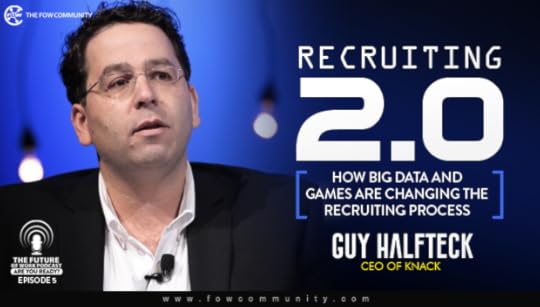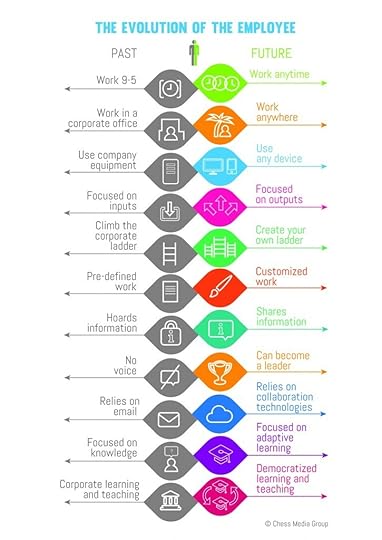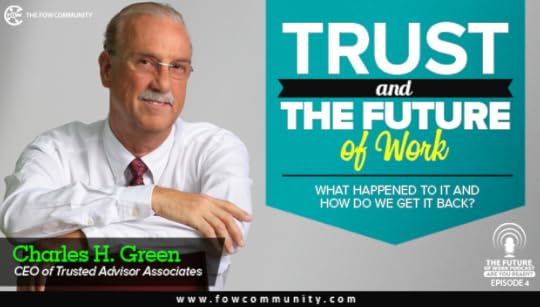Jacob Morgan's Blog, page 30
October 8, 2014
20 Quotes to Challenge Convention Around the Future of Work
This is one of the bonuses I sent to people who pre-ordered a copy of my book, The Future of Work, last month. Now, I wanted to share it publicly with everyone else. It’s a compilation of some of my favorite quotes from the book and features some of the world’s most forward thinking business leaders. Hopefully this will inspire you to challenge convention around the future of work. Please feel free to share it, embed it, download it, and spread the word!
20 Quotes to Challenge Convention on The Future of Work from Jacob Morgan
 Send to Kindle
Send to KindleThe post 20 Quotes to Challenge Convention Around the Future of Work appeared first on The Future Workplace.






October 3, 2014
Is Reddit’s Decision To Kill Off Remote Workers A Good Idea?
 The popular user generated content site reddit just killed off their remote worker program and issued a mandate that everyone must move to San Francisco or they are no longer going to be employed by the company. Clearly this is causing a lot of discussion and while I don’t think we have the exact details around this, I do have some thoughts on the announcement, in fact we recently released a whitepaper on this very topic called, “The Manager’s Guide to Leading Teams Working Under Flexible Work Arrangements.”
The popular user generated content site reddit just killed off their remote worker program and issued a mandate that everyone must move to San Francisco or they are no longer going to be employed by the company. Clearly this is causing a lot of discussion and while I don’t think we have the exact details around this, I do have some thoughts on the announcement, in fact we recently released a whitepaper on this very topic called, “The Manager’s Guide to Leading Teams Working Under Flexible Work Arrangements.”
The big issue with many physical workplaces today is that they are a poor reflection of how we want to work, the year that work in (we live in 2014 and work in 1975), what we value, or how we see ourselves. When your physical environment doesn’t align with your values, approaches towards work, or how you work- you start to resent it. This is why so many people despise cubicles and why so many offices today seem antiquated.
However, having just come back from the AirBnB headquarters in San Francisco I can say that there plenty of office spaces around the world that do a great job of getting employees to WANT to work there. Lithium Technologies, Pixar, Airbnb, The Motley Fool, and others all do a wonderful job of this. These companies also don’t force a standard 9-5 work day. In other words, your office is your home base but if you need to leave at a certain time to run an errand or pick up a kid from school, you can do it.
I strongly believe that we don’t HAVE to rely on offices as the only place that work needs to get done, in other words, I don’t agree with a “you have to come into work every day from 9-5″ approach. Still, we have to remember that flexible work and tele-work are not the same thing. Flexible work gives employees a choice of when and where they work but an office can be one of those choices which means that you can ask for some common “physical time” every week but not require that ALL work be done in an office. Today, we can work from anywhere we have an internet connection so it seems a bit nuts for any company to force people to come into the office unless that is what their corporate culture supports.
The corporate culture clearly plays a big role here, there are many companies around the world that have full-time remote employees which are always location independent and timezone independent. Some companies force a 9-5 in office work-day and others seem to be more willing to meet in the middle.
But, if companies want employees to come to an office they should absolutely create a physical environment that people will actually want to come to, otherwise what’s the point? I see nothing wrong with flexible or remote work.
So back to Reddit, overall I don’t agree with their approach for several reasons, many of which were outlined in the article above:
the very employees who helped make reddit successful are getting canned
talent doesn’t only exist in SF
I haven’t seen data which shows that remote work hurts of hinders collaboration
the cost of living in and around SF is among the highest in the nation so forcing people to uproot and move there is a bit extreme
many companies around the world have part/full-time remote workers and flexible work programs and are doing quite well with them
What do you think about their recent announcement?
 Send to Kindle
Send to KindleThe post Is Reddit’s Decision To Kill Off Remote Workers A Good Idea? appeared first on The Future Workplace.






October 2, 2014
Education Is Broken: Open Badges Might Be The Solution
Click Here to Subscribe via iTunes
Click Here to Subscribe via RSS Feed (non-iTunes feed)
Click here to download the episode (right click “save as”)
http://traffic.libsyn.com/futureofworkpodcast/Jade.mp3
The one stat you need to know
I’ll use this excerpt from Sir Ken Robinson’s Huffington Post article
“In 1970, the U.S. had the highest rates of high school graduation in the world, now it has one of the lowest. According to theOECD, the overall U.S. graduation rate is now around 75 percent, which puts America 23rd out of 28 countries surveyed. In some communities the graduation rate is less than 50 percent. About 7,000 young people ‘drop out’ of the nation’s high schools every day, close to 1.5 million a year. The social and economic costs are enormous.”
What this episode is about and why you should care
Pretty much anywhere you go today you can hear about the issues and challenges with our education system, especially in the United States. Whether it’s our falling test scores, decreasing graduation rates, increased cost of education followed by increased debt, or just the fact that our education system seems outdated – it seems that there is consensus that something needs to change. But can Open Badges be the solution?
An open badge is a representation of a skill or an achievement. It is issued to recognize these skills and achievements which may help with future education and career opportunities. Think of the cub scouts or even a popular video game where you level up and earn badges and experience points for your accomplishments, now imagine something similar being applied to the world of education. Transcripts and your college diploma are representations of your theoretical knowledge. On the other hand, badges are the representations of the skills and experience you gradually learn and develop through time and paint a much better picture of who you are and what you are good at.
To learn more about open badges and why they are increasingly getting popular in educational institutions as well as in corporations, I talked to Jade Forester who is the Global Coordinator for the Badge Alliance.
What you will learn in this episode
The definition of badges in a learning environment
The purpose and types of badges in a traditional education setting
Examples of educational institutions and companies that are using open badges
The reason why the concept of badges was developed
What needs to happen for employers to be able to take these badges seriously or look at these badges as a way to evaluate potential employees
Determine whether open badges is the solution for the future of education and competency-based learning
Which parts of the world are adopting open badges more than others
A look of open badges in the future.
Links from the episode:
Jade Forester (jade_forester) | Twitter
 Send to Kindle
Send to KindleThe post Education Is Broken: Open Badges Might Be The Solution appeared first on The Future Workplace.






October 1, 2014
One Company’s Quest To Eliminate Email
In 2011 the Chairman and CEO of Atos, Thierry Breton, publicly announced that he was on a mission to become a zero email company by 2013 (at least as far as employee communication and collaboration was concerned). When he announced this a few years ago it’s safe to say that their were plenty of cynics and skeptics, after all, how could a global information services company with over 76,000 employees in 47 countries get rid of email? However, Thierry realize that email is not an effective way for employee to work, collaborate, or communicate, instead it was decided that a shift towards more collaborative platforms was required.
This infographic helps tell the story of the Atos zero email initiative:
He [Mr. Breton] estimated that barely 10 per cent of the 200 messages his employees received on an average day were useful, and that 18 per cent were spam. Managers spent between five and 20 hours a week reading and writing emails.”
The article went on to say that,
“When 300 Atos employees measured their email traffic for a week, they found they had sent or received 85,000 messages. Within Atos, 73 per cent of employees estimated they spent more than one quarter of their time managing email, and 82 per cent said they had trouble keeping on top of it. Most importantly, the majority felt this time was wasted and added no value to their day or to the company.”
Clearly these numbers are a bit scary and demonstrate clear justification for the need to go email free. So, three years later, how is Atos doing with their initiative? Well, they aren’t email free yet but Gartner recently did a report on them and here are some recent numbers.
2013 operating margin is 7.5, up from 6.5 percent in 2012. Free cash flow increased year over year from €267 million to €365 million, earnings per share increased more than 50 percent, and selling, general, and administrative costs declined from 13 percent to 10 percent. It’s hard to give all of this credit to email reduction but it is correlated.
Atos did reduce email by 60% going from 100 email messages per inbox per week to just under 40 by the end of 2013. The average number of internal email messages dropped from 100 per mailbox per week in 2011 to fewer than 40 by the end of 2013, a 60 percent reduction. The goal was to reduce this by another 20% by mid 2014 but I wasn’t able to find any current numbers on if this actually happened
Through using their own internal collaboration platform (called blueKiwi, which they acquired a few years ago) they now have over 74,000 employees who are participating in around 7,500 communities and posting nearly 300,000 times per month and viewing almost 2 million pages per month.
Through their report Gartner identified four key practices to help with major corporate culture change (in this case, getting rid of email)
Clear and compelling justification- Managers were very clear and specific with how zero email impacts employees and what this initiative means to how they work. The effort must make sense for employees as individuals, a point that I have been driving across for several years!
A sense of urgency- Setting a clear deadline and making this effort public and tangible was key.
Big investment and complete commitment- Atos tied bonuses and performance evaluations to the zero-email effort (10% of an executives bonus was tied to this). Gartner estimated that Atos is investing 500x more than what a typical company invests in their collaboration efforts. This might sound like a lot but I can tell you from personal experience that most of companies I have worked with or researched are actually under investing in their programs!
Collect success stories- Atos collected and shared as many success stories as they could. One story came from a service desk in Brazil where it was reported that customer issues were resolved up to 30% faster as a result of this effort and that both employee and customers were happier.
Clearly what Atos is attempting to do falls on the “outlier” scale but it should be an inspirational call to action for other organizations around the world to take steps towards creating a more collaborative organization where communication doesn’t depend on technology that was invented in the 70′s. As I’ve long stated, we shouldn’t have to live in 2014 and work in 1975. If a global organization with 76,000 employees can reduce and almost eliminate email, than so can your organization.
Now…go check your email.
 Send to Kindle
Send to KindleThe post One Company’s Quest To Eliminate Email appeared first on The Future Workplace.






September 29, 2014
FOW Community Update!

It’s been a few weeks now since we first launched the FOW Community to a very small and select group of members. We learned a lot through our initial (albeit quiet) launch and are getting ready to kick things up a bit. The goal of the community is to prepare organizations for the future of work by giving them access to valuable resources and a valuable network of some of the world’s most forward thinking and progressive companies around the world. We have a lot of themes and topics we want to tackle such as the internet of things, collaboration, millennials in the workplace, the sharing economy and much more. As the community grows so will the themes.
On the member side of things we are very pleased to have companies such as Wells Fargo, CEMEX, Sanofi, SAP, Alberta Energy Regulator, and others as FOWC members with several additional companies in the approval queue waiting to join.
Every month members get access to between 5-10 different types of content around the future of work. We are now regularly providing members with:
1-2 webinars every month where a guest comes to present on a specific topic, thus far we have explored things such as organizational design and workplace productivity, a non-IT focused approach to collaboration, the five trends shaping the future of work, and others.
4 podcasts every month (trying for 1/week) that focuse on a specific theme related to the future of work or on a unique company
2-4 whitepapers every month that provide educational content around a specific theme related to the future of work such as holocracy as an evolution of collaboration and five fears of the millennial generation
1-2 report summaries every month where we take a research report that someone like a PwC may have created and distill into a very short easily digestible report summary that gives members all the key information they need
We have also made significant updates on the technology side since we custom-built an entire community for our members. Updates here include:
streamlined activity feeds to make it easier for members to see what’s going on in the community
the ability to link to specific status updates that members create
using hashtags within the community, this was widely requested and is now available
creating a single notification center where members can see who is commenting on content, liking content, etc.
improved UI/UX experience
weekly email digests so members can stay up to speed on the latest conversations, find out about new members, and learn about the more recent resources
and much more
The important thing to point out about the platform itself is that since we created it we can add new features to it and customize it based on what the members want and like.
Perhaps the most valuable thing that members get access to is each other, a collection of some of the smartest and most progressive organizations that thinking about how the world of work is changing. These members ask each other questions, share links, and provide advice and support to one another and it’s fantastic to see!
We are in the process of starting to explore our first physical event to happen some time in 2015 and have lots of other exciting plans such as launching a type of innovation network for members to connect to, gamification for the community, resource tagging and categorization, and much more! The community is barely a month old (if that) and we are all very excited to see where it goes and how it grows. Members can expect new features (that they help decide on) to be released approximately every quarter.
We are now going to significantly kick up our marketing and efforts to let more people in the world know about the FOW Community!
No other community like this exists. If you are interested in learning more or requesting and invite you can do so by visiting the FOW Community or by emailing me directly, Jacob [at] fowcommunity [dot] com.
Onward!
 Send to Kindle
Send to KindleThe post FOW Community Update! appeared first on The Future Workplace.






September 25, 2014
The Future of Work Podcast, Episode 5: Guy Halfteck – How Big Data and Games are Changing the Recruiting Process
Click Here to Subscribe via iTunes
Click Here to Subscribe via RSS Feed (non-iTunes feed)
Click here to download the episode (right click “save as”)
http://traffic.libsyn.com/futureofworkpodcast/guy.mp3
The one stat you need to know
“More than 70% of organizations cite “capability gaps” as one of their top five challenges according to Bersin by Deloitte.”
What this episode is about and why you should care
Recruiting is fundamentally broken and oftentimes organizations can’t find the right person for the right job. Sitting in an interview and answering a bunch of questions about yourself doesn’t really tell organizations much about a prospective candidate, nor does it allow the candidate to truly share what their skills and competencies are. so what’s the solution? Perhaps it’s games and big data!
This episode talks about using games as an effective recruitment tool in determining a person’s potential, skills, talents, and strengths. I talked to the creator of Knack, Guy Halfteck, on how these games he created can help in discovering a person’s “knack” to identify career direction.
In the traditional recruitment process, a lot of people get jobs based on how they present themselves in person. This is where human judgment or subjectivity comes into play, and potentially leads to biases. While in games, you are judged based on scenarios you are presented with, where you have to make decisions based on those situations. Knack looks at over 200 variables for how someone plays a game including how long it takes them to make decisions, what kinds of decisions they make, where they hold the mouse cursor, how they prioritize actions, and a bunch of other things. The result of these games is a set of “knacks” which are presented in the form of types of badges which can tell an organization if someone is risk averse, cool-headed, empathetic, patient, and much more.
This is a fascinating look into a new area being known as “people analytics.”
What you will learn in this episode
The difference between using games and big data vs the traditional method of recruiting
How data collected using games can help recruiters figure out who the best people are
The amount and types of data you can collect from different types of games
Examples of recruitment scenario when games are incorporated in the application process
A look at the human component when shifting to this type of recruitment process
What the role of big data is within this new type of recruitment
How companies are using games for recruitment
Can these games prevent people from getting a high level job or from moving up?
Can knack solve the ultimate problem of skills gap that recruiting and talent management is facing today – getting the right people for the right job
What the future of the games and recruitment might look like
Links from the episode:
Knack (email: guy@knack.it)
 Send to Kindle
Send to KindleThe post The Future of Work Podcast, Episode 5: Guy Halfteck – How Big Data and Games are Changing the Recruiting Process appeared first on The Future Workplace.






September 23, 2014
Keynote Panel on Workforce 2020 From Success Connect Conference (Video)
I spent the past week in Kauai with my (now) wife, Blake Landau, (for our honeymoon) where we ate lots of good food, explored the island in a helicopter, took a boat tour, swam in the ocean, and did all sorts of fun touristy things. Shortly before I left I had the great opportunity to participate in a keynote panel at the Success Connect Conference (for SuccessFactors which is owned by SAP) in Las Vegas in front of over 2,000 HR practitioners and leaders from around the world. The panel started off with a 20 minute presentation by Edward Cone from Oxford Economics who shared their recent findings from a “Workforce 2020″ report which explored everything from contingent employees to millennials in the workplace. I embedded the video below and have it starting during the actual panel discussion but if you want to see it starting with Ed’s presentation then just scroll back, enjoy!
>
 Send to Kindle
Send to KindleThe post Keynote Panel on Workforce 2020 From Success Connect Conference (Video) appeared first on The Future Workplace.






September 16, 2014
The Evolution Of The Employee
This concept and the visual was taken from my new book which just came out called, The Future of Work: Attract New Talent, Build Better Leaders, and Create a Competitive Organization.
One of the things I have been writing about and have tried to make clear over the past few months is that work as we know it is dead and that the only way forward is to challenge convention around how we work, how we lead, and how we build our companies. Employees which were once thought of expendable cogs are the most valuable asset that any organization has. However, the employee from a decade ago isn’t the same as the employee who we are starting to see today. To help show that I wanted to share an image from my upcoming book which depicts how employees are evolving. It’s an easy way to see the past vs the future.
Based on the above evolution these are the key things to pay attention to…
Truly flexible work
The first two items above along with “focusing on outputs” comprise this idea of flexible work, that is working anytime, anywhere, and being evaluated not by how many hours you sit in a chair but by what you produce. There is no longer a need for most employees to work from an office or to work 9-5. Unilever is doing a great job of this where they are rolling out this concept of (what they call) “agile work” to their 175,000+ employees around the world. Aetna and American Express are among other organizations leading the way for flexible work. The future employee will only work in this way.
Use any device
We’re already starting to see this with BYOD but gone are the days of company sanctioned phones and computers. Instead, the future employee will be able to use any device they chose to get their jobs done. Companies like Ford, IBM, and Intel have been among those leading the way in allowing their employees to use many personally owned devices for work.
The death of the “ladder” and customized work
When you start working for a new company usually you start off at the bottom of the proverbial totem pole. In other words you begin as a sales coordinator, then a sales manager, senior sales manager, sales director, and so on and so forth. You have to climb the ladder for a few years in the hopes that one day you will reach a position that you are happy with. However with the freelancer economy, collaboration platforms, and new management approaches; employees are now starting to shape their own career paths and how they actually work. Companies like Deloitte offer something called the Mass Career Customization Program which allows employees to change their work preferences twice a year, changes include things such as making a lateral move within the company or selecting how much time an employee wants to spend traveling. Other organizations like Valve or Treehouse allow employees to completely pick the projects they work on or who they work with!
Sharing is caring
Employees use to hoard information and keep it to themselves. There was no incentive, scalable way, or reason for employees to share what they know with others. Knowledge is power and if employees keep their ideas to themselves then they have the power. Employees were also not encouraged to share or think creatively, their job was merely to show up to work and perform their tasks…that’s it! For the future employee the exact opposite is true. Collaboration platforms are making it easy for employees to share information and organizations are creating incentives to do this ranging from internal incubators to intrapreneuer programs to open innovation programs. Internally, email is also shifting from being the primary form of communication to being the secondary form of communication.
Going forward any employee can have an idea that can turn into a new product, service, or opportunity. Shell with their GameChanger program and Whirlpool with their “Winning Workplace” program are just two examples of organizations that are shifting their culture from hoarding to sharing.
Anyone can be a leader
As mentioned above employees were thought of as being expendable cogs which meant they had no voice within the organization. Once again, collaboration technologies play a crucial role as they give any employee within an organization the chance to be a recognized leader by sharing their ideas, thoughts, concepts, etc. Any employee that is able to build a following with the content they share internally is capable of being a leader; something which was not possible before especially not at the scale that collaboration platforms allow today. Think of how many people have become leaders as a result of social platforms such as Twitter, Instagram, or Facebook, now employees can do the same inside of their companies.
Knowledge vs adaptive learning
Knowledge is now nothing more than a commodity. To be the world’s smartest person all you need to do is pull out your cell phone where you have access to anything you need to get answers to. This means that for the future employee it’s not knowledge that is the most important but the employee’s ability to learn new things an apply those learnings to new situations and scenarios that come up. In other words, always being able to learn how to learn and stay adaptable. This is far more important and valuable than what you “know.”
Everyone is a teacher and a student
In most organizations today if you want to learn something you have to sign up for and attend a class that may be a few days or a few weeks away. Today (again thanks to collaboration platforms) any employee can take out their cell phone and record a “how-to” for anything ranging from setting up a modem to programming something on excel. Simply being able to connect employees to each other provides a way for democratized learning and teaching in ways that were never before possible. Thanks to sites such as Udemy, Coursera, and Khan Academy we have the ability to learn what we want to learn and teach what we are uniquely qualified to offer to others.
 Send to Kindle
Send to KindleThe post The Evolution Of The Employee appeared first on The Future Workplace.






September 11, 2014
The Future of Work Podcast, Episode 4: Charles H. Green – Trust and the Future of Work
Click Here to Subscribe via iTunes
Click Here to Subscribe via RSS Feed (non-iTunes feed)
Click here to download the episode (right click “save as”)
http://traffic.libsyn.com/futureofworkpodcast/Charliepodcastmp3.mp3
The one stat you need to know
“Nearly 1 in 4 workers say they don’t trust their employer and only about half believe their employer is open and upfront with them.”
What this episode is about and why you should care
When we think about the future of work “Trust” falls flat and center as a topic that must be addressed, especially since it seems as though trust today seems to be at an all time low. We used to do business with a handshake and today we use massive legal document-based transactions which shows how companies and individuals have less trust between one another. We need trust among employees and among managers. Without trust we can innovate, collaborate, share, communicate, or work. So what has happened to trust over the past few years? How did we get to where we are today? What does the future of trust look like? And what do organizations need to be thinking about to help build trust among their employees and managers? Here to talk about trust is Charles Green who spent most of his career focusing on trust and trust-based businesses. He is one of the smartest guys I know and provides a fascinating and non-conventional perspective on what trust is and how to create it.
What you will learn in this episode
Reasons why modern businesses have trust issues
How the simple handshake agreement would pan out in the future
How technology simplifies trust with a click of a button
The problem of the distinction between lack of trustworthiness and lack of willingness to trust
Distinction between trust towards people and trust towards institutions
The decrease of trust and loyalty within organizations or businesses and its advantages
Solutions for the decreasing loyalty of employees and retention of employees
How the idea of “job-hopping” and trust relates with each other
The importance of motives of millennials who are “job-hopping” and how “job-hopping” is not a bad thing
How to build trust as an employee towards managers and peers
The trust equation and how it works
How to build trust as a manager towards employees
The relevance of collaboration platforms with building up trust
The advantages of sharing ideas and how it builds trust among people
Ways to cut through long contracts and makes things much simpler and easier
Advantages of being trusting in a business relationship and taking a personal risk
The reciprocity of trust and how it works
Charlie’s personal advice on people who had their trust tainted by other people’s betrayal
How getting personal builds trust and its importance
Charlie’s personal advice for people who are starting out in building trust
Links from the episode:
The Trusted Advisor (Amazon)
 Send to Kindle
Send to KindleThe post The Future of Work Podcast, Episode 4: Charles H. Green – Trust and the Future of Work appeared first on The Future Workplace.






September 10, 2014
How To Attract the Right People With Transparent Compensation
This is a guest post from Jurgen Appelo who is the author of “#Workout: Games, Tools & Practices to Engage People, Improve Work, and Delight Clients (Management 3.0) and is one of the top top leadership and management experts in the world according to INC. I asked him to share his thoughts on a topic that I find to be quite interesting, transparent compensation.
Enter Jurgen…
If only things were always transparent! It took me years of building a reputation as a technical leader and a track record as a development manager before I was allowed to take over responsibility for the project management department in our company, only to discover that during all that time, the project managers had been paid more than the software developers.
While researching literature on the topics of compensation plans and salary structures, I came across one article that contained strong advice for human resource managers to “keep the salary ranges in the strictest confidence”. Yes, that makes total sense if you don’t want anyone to find out they’re being screwed! Fortunately, not all companies follow this advice. In fact, depending on where you live, demanding confidentiality probably isn’t even legal. [Meyer, “Appeals Court Says Employees Can Openly Discuss Wages”]
We live in a different age now. With the rise of the Internet and social networks, more and more people have become accustomed to the idea of sharing (almost) everything about themselves. On Twitter, we let people know where we are; on Instagram, we show what we eat; on Amazon, we publish what we read; and with AirBNB, we even rent out our homes to complete strangers. Why should we make a fuss about people finding out how much we earn? [Gascoigne, “Open Salaries at Buffer”]
Be Transparent
I see many companies switching to transparency of finances and publication of their compensation plans. Research confirms that pay secrecy only hurts a company’s culture and results in negative morale, decreased performance, and higher turnover. [Belogolovsky and Bamberger, “Secret Salaries Hurt Worker Performance”] Therefore, defaulting to transparency and making everything publicly available, perhaps even to outsiders, can be a smart move. Yes, everyone will be able to figure out what everyone else earns. Why is that a problem? A transparency policy is a good thing because it forces management to be fair to everyone. [Griswold, “At Whole Foods, Employees Can Look Up Other Employees’ Salaries”] When a few employees don’t like that, the problem resides more likely with personal attitudes or with unfair salaries than with the transparency policy itself. A ban on secrecy has a tendency to scare away people with a bad attitude, which helps to reinforce a good culture instead of feeding a poisonous one. [Elmer, “After Disclosing Employee Salaries”]
No Hidden Agendas
Will there be discussions when you open the books on salaries? Of course there will! [Nisen, “Why You Should Reveal Everyone’s Salaries”; Silverman, “This Is What Your Co-Worker Is Paid”] But these discussions will reveal the problems that are already in the system; and by dealing with them, you stop them from festering and poisoning your company’s culture. Of course, it requires that you have a fair compensation plan in place that is able to explain what everyone’s salary is. When nobody can easily explain it, that’s a good reason not to show it!
When you announce your plan for a transparency policy and people respond with alarm and even threaten to quit their jobs, I would just let them go. I would even open the doors for them. Thank you and goodbye! At the same time, I would leave the doors open for the many people outside who learn about the new fair compensation policy and want to get in.
The move toward transparent compensation plans is a global trend. Some even say companies don’t really have a choice. [Silverman, “This Is What Your Co-Worker Is Paid”] Obviously, I don’t mean to say that you should start posting everyone’s individual salaries on your company’s public website tomorrow. Experiment, take small steps, and think about where you want to go. Use your compensation plan to reward people for the right behaviors. That means no politics, no secrecy, and no hidden agendas.
Sources:
Belogolovsky, E. and P. Bamberger. “Secret Salaries Hurt Worker Performance, Increase Top-Talent Turnover” ScienceDaily, 26 February 2014. Web.
Elmer, Vickie. “After Disclosing Employee Salaries, Buffer Was Inundated With Resumes” Quartz, 24 January 2014. Web.
Gascoigne, Joel. “Introducing Open Salaries at Buffer: Our Transparent Formula and All Individual Salaries” Buffer Open, 19 December 2013. Web.
Griswold, Alison. “At Whole Foods, Employees Can Look Up Other Employees’ Salaries” Entrepreneur, 4 March 2014. Web.
Meyer, Eric B. “Appeals Court Says Yes, Employees CAN Openly Discuss Wages” TLNT, 27 March 2014. Web.
Nisen, Max. “Why You Should Reveal Everyone’s Salaries” Open Forum, 25 September 2012. Web.
Silverman, Rachel Emma. “Psst… This Is What Your Co-Worker Is Paid” The Wall Street Journal, 29 January 2013. Web.
Jurgen Appelo is the most popular European leadership author, listed on Inc.com’s Top 50 Management Experts. His latest book Management 3.0 #Workout, full of concrete games, tools, and practices, is available for free. Download it here: http://m30.me/wo
 Send to Kindle
Send to KindleThe post How To Attract the Right People With Transparent Compensation appeared first on The Future Workplace.














